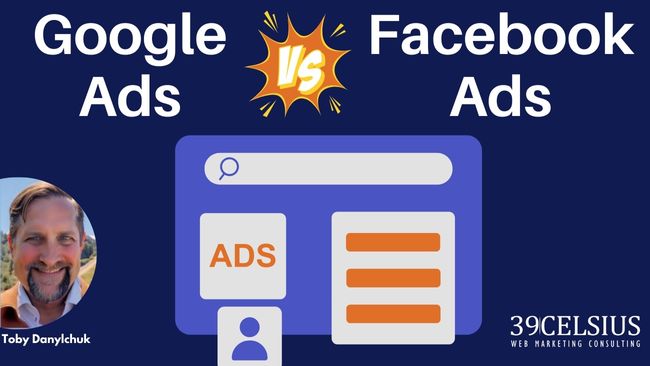The numbers are staggering – over 2 billion people use Facebook daily (source: statista), and Google sees more than 8.5 billion daily searches (source: Oberlo)! Google and Meta (Facebook/Instagram) are the 800-pound gorillas in digital marketing.
No other online platforms see anywhere near these kinds of numbers. Any other platforms, such as TikTok, Snap, or X, are niche players. The sheer volume is partly what makes each platform so valuable to you as an advertiser – your customers are on both of these platforms in large numbers. And, as a result, between Facebook and Google, you can market to almost anyone.
But which one is better?
Facebook ads or Google Ads (formerly Google Adwords)?
Which one is more effective?
And which one should you use? Or should use both?
Every advertising situation is unique. And to answer these questions correctly depends on many variables, such as:
- Who is your target audience?
- What is your ad budget, and how much are ads going to cost?
- Ad objectives - are you trying to create buzz, or leads?
- Ad Formats and Content: does your product or service display well with video and rich media? Or single images?
- User Intent: Each platform targets users with different intent.
- Competition: How competitive is your product or service, and your local market?
I will outline the differences between both platforms, which one is better suited than the other by going through several scenarios and examples. Use these scenarios to apply to your current situation.
So my goal with this post is to help you understand both platforms' strengths and weaknesses and give you additional ideas for targeting potential customers and to make better decisions for your own campaigns.
Ready? Here we go…
A note before we get going - when we reference Facebook Ads, we’re talking about both Facebook and Instagram Ads. Facebook owns Instagram, and when you run ads on Facebook, they run on both platforms.
Using Facebook for Your Target Audience
Scenario:
Imagine you run a boutique clothing store that specializes in trendy, eco-friendly fashion for young adults. Your primary target audience includes environmentally conscious individuals aged 18-35 who value style and sustainability.
Why Facebook Ads?
- Demographics: Facebook’s/Intagram user base includes a wide range of young adults, fitting your target demographic.
- Interests and Lifestyle Targeting: Facebook allows you to target users based on their interests, behaviors, and even the pages they like. You can specifically target individuals who have shown interest in eco-friendly products, fashion, and sustainability.
- Visual Engagement: Your product is visually appealing, and Facebook is a platform where visual content (like images and videos) performs well, allowing you to showcase your clothing effectively.
- Brand Awareness: Facebook is great for building brand awareness. You can create engaging content that gets shared, increasing visibility beyond your initial target audience.
- Community Building: You can use Facebook to build a community around your brand, encouraging discussions and interactions that foster brand loyalty.
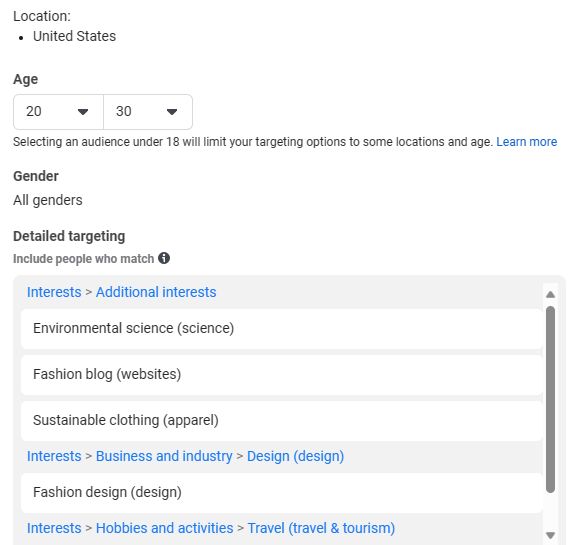
Facebook Targeting Young Adults - Love Style - Sustainability
Using Google Ads for Your Target Audience:
Scenario:
Suppose you own a plumbing service that provides emergency leak detection and restoration in a specific city. Your target audience includes homeowners and landlords who need immediate plumbing services.

Emergency Plumbing Services - Google Ads
Why Google Ads:
- Intent-Based Targeting: People searching for plumbing services on Google have immediate needs. They are likely to search terms like “emergency plumber near me” or “lead detection in [City]”. Google Ads allow you to target these high-intent searches. High intent means people that are ready to buy now!
- Local Targeting: Google Ads is effective for local businesses. You can target your ads to appear for searches in your specific service area, reaching customers who are nearby and likely to need your services.
- Service-Oriented: For services like plumbing, users typically turn to Google to find immediate solutions. They are more likely to use search engines rather than social media when in need of such services.
- Direct Response: Google Ads can be more effective for driving immediate action, like a phone call or a service booking, which is essential for your business.
Discover How Our Agency Can Drive More Leads and Sales To You
SEO - increase traffic and leads from Google
Content Marketing - from a data-driven topic strategy to awesome content
Paid Ads - Google Ads and Paid Social Media
Using Facebook Ads Based on Budget:
Scenario:
You run a small online jewelry store with a limited marketing budget. Your goal is to increase brand awareness and engagement without spending a large amount of money.
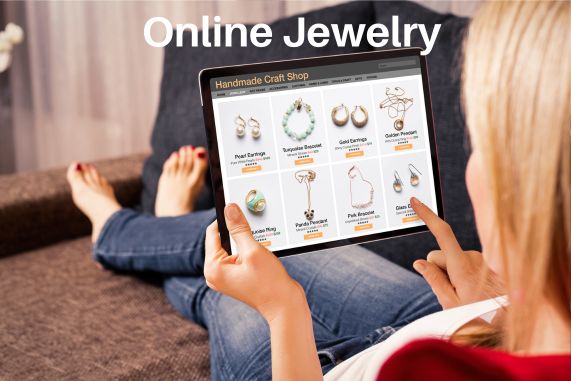
Online Jewelry Store - Facebook Ads
Why Facebook Ads:
- Cost-Effectiveness for Brand Awareness: Facebook ads generally offer a lower cost per thousand impressions (CPM), making them a cost-effective choice for increasing brand visibility and engagement, especially if you're targeting a broad audience.
- Detailed Targeting Within Budget: Facebook allows for very specific targeting based on demographics, interests, and behaviors. This means you can tailor your ads to a very specific audience segment without needing a large budget.
- Control Over Spend: Facebook provides flexibility in ad spend. You can set daily or lifetime budgets and adjust them as needed, ensuring you don't overspend.
- Visual and Creative Ads for Less: Creative content like videos and images can be produced inexpensively and are well-suited for Facebook, allowing for impactful advertising without a high production cost.
Using Google Ads Based on Budget:
Scenario:
You own a local law firm specializing in criminal law. Your primary objective is to attract clients who are actively seeking legal advice or services in this niche. Keep in mind, Google offers two core ad solutions: Google Ads and Local Service Ads (LSA). The former is pay-per-click (PPC), and the latter is pay-per-lead. Google only offers LSA in a small niche of industries (e.g. plumbers, lawyers, electricians, appliance repair, etc). (read our related case study comparing cost per lead for attorneys with Google ads vs Local Service Ads (LSA)).

Law Firm - Google Ads - Google LSA
Why Google Ads:
- High Intent Targeting: Google Ads operates on a pay-per-click (PPC) model, which can be more cost-effective when targeting users with high purchase intent. People searching for specific legal services are more likely to convert, making your ad spend more efficient.
- Budget Control with PPC (pay-per-click): With Google Ads, you pay only when someone clicks on your ad. This can be more budget-friendly for services with higher customer lifetime values, like legal services, where a few high-quality leads can justify the ad spend.
- Local Service Ads: For local businesses, Google offers Local Service Ads, which are pay-per-lead (not pay-per-click), which are typically cost-effective and appear at the top of search results, ideal for businesses targeting a local market with high intent to buy now.
- Adjustable Bidding Strategies: Google Ads allows for flexible bidding strategies. You can choose automated bidding to maximize conversions within your set budget, or manual bidding to have greater control over how much you pay per click.
In both scenarios, the choice of platform is influenced by the nature of the product or service offered, the target audience, and the specific goals of the advertising campaign, all while considering the allocated budget and desired cost-efficiency.
Using Facebook Ads for Specific Objectives:
Scenario:
You are launching a new line of fitness apparel and want to create brand awareness and engage with a community interested in fitness and wellness.
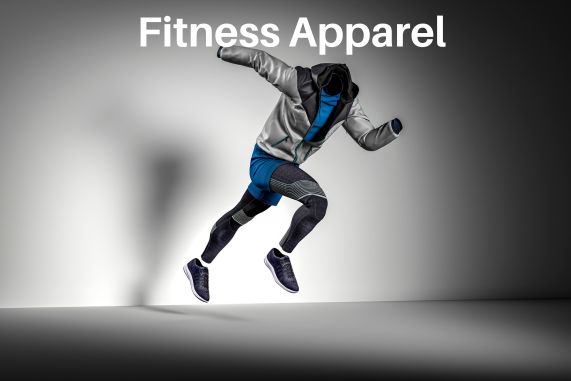
Fitness Apparel Store - Facebook Ads
Why Facebook Ads:
- Brand Awareness and Engagement: Facebook is excellent for creating brand awareness due to its vast user base and the social nature of the platform. You can reach a large audience, including those who might not be actively searching for your product but would be interested once they see it.
- Visual and Lifestyle Marketing: Facebook supports rich, visual content that can showcase your fitness apparel in a lifestyle context, which is great for creating an emotional connection with your audience.
- Community Building and Interaction: The platform is conducive to building a community. You can engage with your audience through comments, shares, and likes, creating a loyal customer base.
- Targeting Based on Interests and Behaviors: Facebook's detailed targeting options, based on user interests and behaviors, are perfect for reaching people interested in fitness, health, and wellness.
Using Google Ads for Specific Objectives:
Scenario:
You run a software company offering project management tools and your objective is to generate leads and conversions from businesses looking for such solutions.

Software - Google Ads
Why Google Ads:
- Lead Generation and Conversions: Google Ads is highly effective for lead generation and conversions, especially for businesses offering specific products or services like software. Users searching on Google have a higher intent, often looking for immediate solutions.
- Targeting Based on Search Intent: With Google Ads, you can target users based on the keywords they use in their searches, such as “best project management software” or “project management tools for businesses,” reaching those who are actively seeking what you offer.
- Direct Response Marketing: Google Ads is ideal for direct response marketing. You can create ads that drive action, such as signing up for a free trial, downloading a brochure, or scheduling a demo.
- Measurable ROI for Conversion-Oriented Campaigns: Google Ads provides robust tools for tracking conversions and measuring ROI, which is crucial for businesses focusing on lead generation and direct sales.
In both examples, the choice of the advertising platform aligns with the specific objectives of the campaign: Facebook for creating brand awareness and community engagement, and Google for targeting high-intent users for lead generation and direct conversions.
Using Facebook Ads for Specific Ad Formats:
Scenario:
You own a travel luxury travel company that specializes in tailor-made itineraries and wants to showcase the beauty and excitement of your trips through engaging visual content.

Luxury Travel - Facebook Ads
Why Facebook Ads:
- Rich Media Content: Facebook and especially Instagram excel at displaying rich media content like high-resolution images and videos. This is ideal for a travel company looking to capture the allure of travel destinations with visually striking content.
- Carousel Ads: Facebook's carousel ad format allows you to showcase multiple images or videos in a single ad. You can use this to feature different destinations, packages, or aspects of a single trip. Carousel ads give people an opportunity to to scroll through images in one ad.
- Video Ads: Facebook is known for its robust video ad capabilities, which can be used to create immersive and engaging content. For a travel company, this could mean captivating videos of destinations, customer itineraries, or immersive 360-degree tours.
- Interactive Ads: With Facebook, you can create interactive ad formats like Instant Experiences (formerly known as Canvas), which are full-screen ad experiences that load instantly and are designed to capture the complete attention of the audience.
Using Google Ads for Specific Ad Formats:
Scenario:
You run an online electronics store and aim to drive sales through ads that directly link to your product pages with clear pricing and product information.

Online Electronics - Google Ads - Product Listing Ads
Why Google Ads:
- Search Ads with Extensions: Google's search ads are text-based and highly effective for driving sales. You can use extensions like callouts, snippets, and site links to provide additional information and links directly to product pages.
- Shopping Ads: Google Shopping ads allow you to showcase your products with images, prices, and a direct link to the purchase page. This is ideal for an electronics store as it allows customers to see the product and price upfront, making it easier to drive sales.
- Responsive Ads: Google's responsive ads automatically adjust their size, appearance, and format to fit available ad spaces, making them highly efficient for reaching a broad audience across different websites and devices.
- Remarketing Ads: Google Ads also allows for effective remarketing campaigns, where you can target users who have previously visited your website with tailored ads. For an electronics store, this means you can remind customers of the products they viewed or abandoned in their cart.
In both scenarios, the choice of the platform is aligned with the type of ad format that best showcases the product or service. Facebook is chosen for its strength in visual and interactive content, ideal for creating a desire for experiential products like travel. In contrast, Google is preferred for its direct, information-rich ad formats that are effective in driving sales for product-based businesses.
Understanding user intent is vital in choosing the right advertising platform. Facebook and
Google caters to different types of user intents, and here are examples to illustrate when to use each platform:
Using Facebook Ads for Specific User Intent:
Scenario:
You run a lifestyle brand that sells eco-friendly home decor. Your target audience isn't necessarily actively searching for your products, but would likely be interested once they see them.
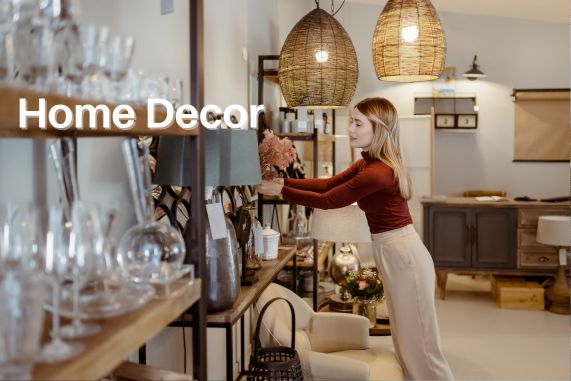
Home Decor - Facebook Ads
Why Facebook Ads:
- Passive Discovery: Facebook is effective for reaching users who are not actively searching for your product but could be interested based on their interests and behaviors. This is known as passive discovery or interruption marketing.
- Interest and Behavior-Based Targeting: Facebook allows you to target users based on their interests, likes, and online behavior, which is ideal for a lifestyle brand. For example, you can target people who follow eco-friendly pages, show interest in home decor, or participate in sustainable living groups.
- Visual Appeal and Brand Storytelling: Facebook’s strength in visual content allows you to showcase your products in a lifestyle setting, telling a story that resonates with the values and interests of your audience.
Using Google Ads for Specific User Intent:
Scenario: You own a personal injury law firm. Potential clients in need of your service are likely to actively search for attorneys only when they are in an accident.

Personal Injury Law Firm - Google Ads
Why Google Ads:
- High Intent Searches (meaning they need services now): Google is the go-to platform for users with high intent, meaning they are actively searching for a specific service or product. In this case, people that are in an accident are likely to search for terms like “personal injury attorney [city]” or “car accident lawyer near me.”
- Keyword Targeting: Google Ads allows you to target specific keywords related to your service. This ensures that your ads appear to users precisely at the moment they are searching for the services you offer.
- Immediate Response and Conversion: For services like emergency plumbing, Google Ads can drive immediate responses, such as calls or service requests, which is essential for businesses where timely intervention is critical.
In these examples, Facebook Ads are chosen for their strength in reaching users based on interests and behaviors, suitable for products or services that benefit from discovery and visual storytelling. Conversely, Google Ads are preferred for targeting users with immediate, specific needs, making it ideal for services requiring urgent solutions.
Understanding the competitive landscape is crucial when choosing between Facebook and Google ads. Each platform has its own dynamics in terms of competition, and here are examples to illustrate when one might be more suitable than the other based on competitive focus:
Using Facebook Ads with a Focus on Competition:
Scenario:
You own a boutique fitness studio that's entering a market with several established gyms and fitness centers.
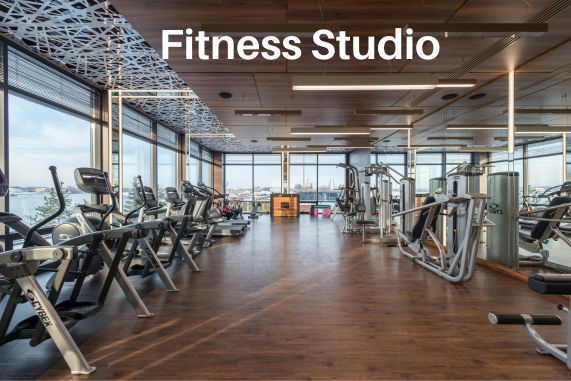
Fitness Studio - Facebook Ads
Why Facebook Ads:
- Differentiating from Competitors: Facebook allows you to creatively showcase what makes your fitness studio unique. You can use visually appealing content and storytelling to highlight unique selling points (USPs), such as specialized classes, state-of-the-art equipment, or a unique fitness philosophy.
- Targeting Competitor Audiences: Facebook’s detailed targeting options enable you to reach people who have shown an interest in or like pages related to your competitors. This allows you to directly engage with an audience already interested in fitness services.
- Building a Brand Community: Unlike Google Ads, Facebook can help you build a community around your brand. Engaging with your audience through posts, comments, and community groups can foster loyalty and differentiate your brand in a competitive market.
Using Google Ads with a Focus on Competition:
Scenario:
You run a local home appliance repair service. The market has several well-established competitors who have been serving the community for years.
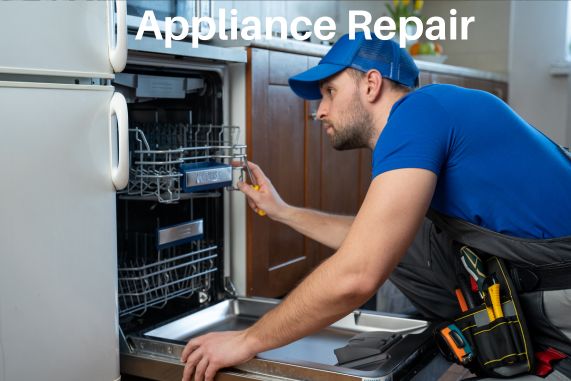
Appliance Repair - Google Ads - Google LSA
Why Google Ads:
- Competing on Search Terms: Google Ads allows you to bid on keywords that are directly related to your competitors' brands or services. This means when potential customers search for your competitors, your ads could also appear, giving you visibility among users actively seeking services in your industry.
- Local Service Ads: For local businesses, Google's Local Service Ads (LSA) can be particularly effective. They appear at the top of search results and are a great way to compete with established local competitors, especially since they include verified reviews and ratings. Plus, they are pay-per-lead, not pay-per-click as the traditional Google Ads are.
- Immediate Need Fulfillment: Since Google Ads are often used by people with immediate needs, your appliance repair service can capitalize on this by appearing at the top of search results when local customers urgently need these services, even if they initially consider a competitor.
In both scenarios, the choice of the platform is influenced by how best to position and differentiate your business in a competitive landscape. Facebook is chosen for its strengths in building brand identity and engaging with competitor audiences through creative content, while Google Ads are preferred for targeting users actively searching for services, including those of competitors, and capturing immediate demand.
In conclusion, the choice between Facebook and Google ads depends on your specific business needs, target audience, and advertising objectives.
In general, use Facebook ads when your goal is to build brand awareness, engage with a specific demographic based on interests and lifestyle, and create a community around your brand through rich, visual content. Facebook is ideal for products and services that benefit from discovery and storytelling.
On the other hand, choose Google Ads for targeting high-intent users who are actively searching for specific products or services. Google Ads excel in direct response marketing, lead generation, and reaching customers with immediate needs, particularly effective for businesses offering solutions to urgent problems.
However, for a comprehensive marketing strategy, consider using both platforms.
Combining Facebook's strength in creating brand awareness and community engagement with Google's ability to capture active searches and immediate needs can provide a well-rounded approach, maximizing reach and effectiveness in your digital marketing efforts.














